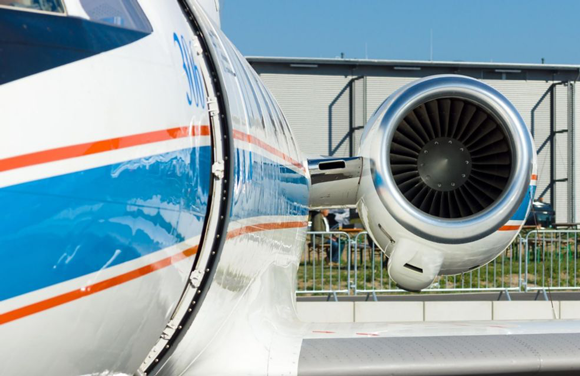Honeywell flight-critical AM engine part achieves certification
August 19, 2020

Honeywell Aerospace, headquartered in Phoenix, Arizona, USA, reports that it has produced and installed its first certified, flight-critical engine part built using Additive Manufacturing. Known as the #4/5 bearing housing, the part is a major structural component in the ATF3-6 turbofan engine used on the Dassault Falcon 20G maritime patrol aircraft.
In service with the French Navy for patrol and search-and-rescue missions, there are reportedly only about a dozen ATF3-6 engines still flying. Designed by Garrett in the 1960s and certified in 1967, there are sourcing and supply chain challenges for operators of these aircraft.
In addition, the #4/5 bearing housing is said to be a complicated part to manufacture – making it extremely costly for operators to replace due to the low quantity of orders placed.
This challenge is combined with the high cost of tools needed to produce parts with traditional casting methods. With Additive Manufacturing, these parts can be built more quickly and in smaller quantities without the need for expensive tools.
“Though there aren’t many in service, Honeywell is responsible for supporting and maintaining these engines,” stated Jon Hobgood, Vice President of Manufacturing Engineering, Honeywell Aerospace. “We had to find a way to address these supply chain issues and keep these aircraft flying.”
“We were able to use our expertise in Additive Manufacturing to produce the qualified part much faster, reducing our lead time from approximately two years to two weeks.”
According to Honeywell, parts such as the #4/5 bearing housing are considered safety-critical or flight-critical by regulatory bodies, meaning they must always function properly. Malfunction or failure of these parts would pose a major threat to passenger and crew safety and could cause significant damage to an aircraft.
Safety-critical parts face increased scrutiny and must be approved by regulatory organisations such as the Federal Aviation Administration (FAA) before they can be used on an aircraft, which makes the process from development to qualification a lengthy one.
Honeywell explains that it has been working closely with the FAA on the development and certification of multiple additively manufactured components and its efforts have enabled the bearing housing to be the first component approved under the normal FAA delegated authority, further reducing the time for qualification.
Production is currently underway for the #4/5 bearing housing, with dozens more of the bearing housing expected to be produced by the end of 2020.
Hobgood added, “This is a major milestone for Honeywell because it demonstrates the maturity of our Additive Manufacturing operations and paves the way for us to print more certified, flight-critical parts in the future. It also is a major win for the additive industry, as flight-critical parts face heavy scrutiny and high standards for qualification and installation on aircraft, but this shows it can be done.”
















